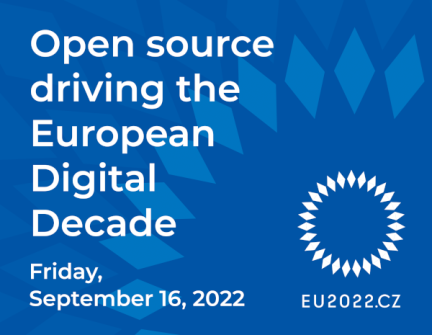
On 16 September, the Czech Presidency of the European Council co-organised an event on Free and Open Source Software in Brno, Czech Republic with panel discussions which included government and public sector representatives from the Czech Republic, France, Sweden and Slovakia. (Programme, Video)
Czech MEP Marcel Kolaja discussed a project he launched in the European Parliament: Free and Open Source Software for European Public Services (FOSSEPS, OSOR article). With support from the European Commission, this aims to identify and bridge gaps between the software that currently exists and what is needed by public administrations. He has also proposed and is awaiting approval for a project which would identify software from the EU institutions which is currently only available on app stores of a few large companies, and do the necessary so that this software would also be available on Free and Open Source app repositories such as F-Droid. He closed by welcoming two recently-launched projects by the European Data Protection Supervisor (EDPS): EU Voice, which is an instance of the Mastodon federalised social network, and EU Video, which is a PeerTube instance.
In January, the Presidency will pass from the Czech Republic to Sweden. Maria Dalhage of the Swedish Agency for Digital Development highlighted the importance of governmental transparency in Sweden, which was enshrined in 1766 in the Press Act on public access to government information. She described Sweden's policy of being "as open as possible, as closed as necessary" and said that the government has a community forum on their national data portal where individuals and companies can ask questions about Sweden's digital commons and open source.
Petra Dzurovcinova, CIO of the City of Bratislava, Slovakia, mentioned that open collaboration is often quite different to the way the public sector works and so this has to be acknowledged and an effort is needed to build trust in this new way of doing things. One initiative for internal transparency that worked well in her city was a monthly "show and tell" session where staff would present changes that are working, and things that aren't working. The goal is to ensure that everyone sees that change is happening for a reason.
On education, Henri Verdier, Ambassador for Digital Affairs for France's Ministry for Europe and Foreign Affairs, raised the issue that "everyone wants to digitalise the educational system, but very often we are just teaching new consumers. We teach the students to use resources." He highlighted the importance of "teaching our children to be contributors, to be active," noting that "if we are not part of the creative movement, we will be just followers".
In addition to announcing code.europa.eu (OSOR article), EC Director-General Veronica Gaffey participated in panel discussion where she mentioned that DIGIT is now involved in the bug bounties and hackathons which were started by the European Parliament and, while acknowledging that "sometimes some of our European funding sources are not so good at supporting innovation", she said that "Next Generation Internet funding seems to be very successful in reaching open source projects".
Petr Očko, the Czech Deputy Minister of Industry and Trade, noted that he started his career "twenty-five years ago as a web developer/code, using primarily open source systems" and said that open source makes it possible to innovate more, it enables competitiveness of regions, and of SMEs in particular, and enables digital hubs which are part of the Digital Europe programme.

